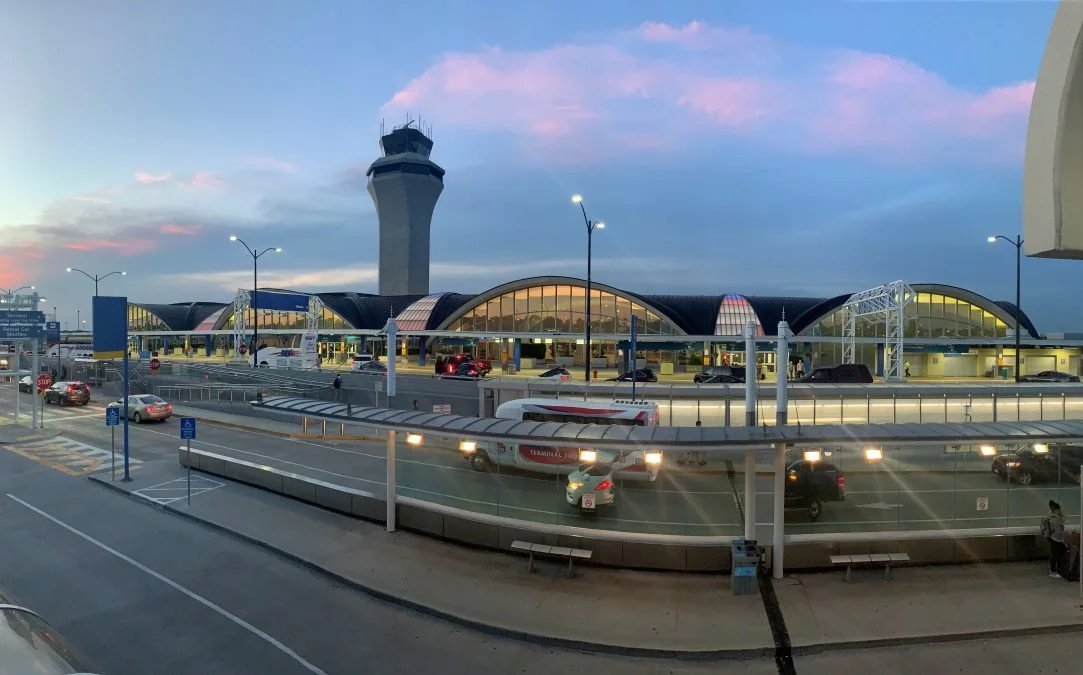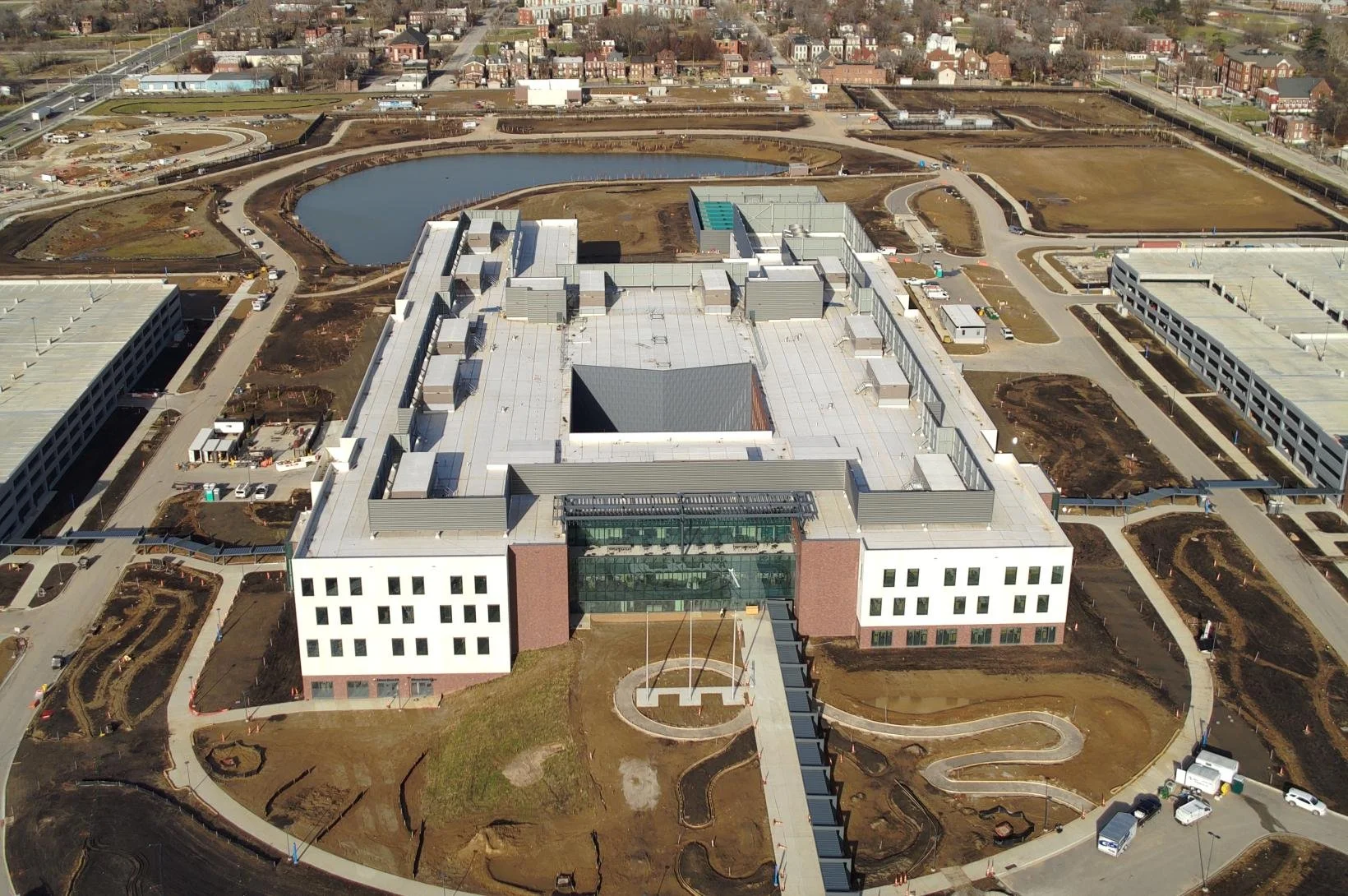Feature photo: Teri Samples, Alison Gray-Gunsten, Monica Conners and Sarah Luem (left to right) at CREW-STL/ULI event in June. Photo credit: MetroWire Media STL.
New medical marijuana dispensary set to open in Pevely
Missouri’s passage of medical marijuana legislation has led to a growing commercial real estate development market for dispensaries that are licensed to serve customers.
CREW-St. Louis took colleagues on a virtual tour of the North Medical Group dispensary in Pevely, Mo. on May 11 to share the selection, design and other topics involved in the upcoming opening of the business.
Connie Kroenung, a consultant with Working Spaces who worked with North on building design, outlined where Missouri is with medical cannabis (any marijuana product created for medical purposes). Patients require a doctor’s referral and license from the state for an ID card to purchase medical marijuana products.
Teri Samples, director of real estate & construction services, Mueller Prost, moderated the session. Panelists included Zach Mangelsdorf, president of North Medical Group LLC; Leonard Volner, vice president of North; and Neil Volner, director of marketing & procurement for North, along with Christi Johaningmeyer, president of Architextures Interior Design, and Geoffrey (Geoff) Crowley, principal with Verve Design Studio.
North originated with Mangelsdorf’s experience as a cancer survivor for whom medical marijuana was the most-effective treatment. The name refers to “true north” as a symbol of the owners’ journey toward achieving their dream for the business.
Membership in the Missouri Cannabis Industry Association led the owners to Crowley, who was impressed that they already had a plan, logo and brand in place. The North building is just off Highway 55 at the Pevely exit, a site chosen to be easily seen and visible from all angles.
“It is in a position to draw attention to the site and the building,” said Crowley. “We wanted to make sure the building was very open and inviting.”
Glazing makes the structure look light, and windows tinted light blue match the logo and provide privacy. Utilities are hidden so the structure looks like one cohesive unit.
The owners chose Pevely because they all grew up in Jefferson County. They plan a second location in Hillsboro once they meet regulations there.
“The three essentials of the building are the security desk for patient check-in, secure retail floor and vault,” said Johaningmeyer, who worked on the interior with colleague Ashley Richardson.
Patients who don’t have to sign in can use an iPad station for pickup, and there’s a touchless process for actually receiving products. iPad stations also provide product information, and there will be “snuffer pods” where patients can smell different products before purchasing. There’s also an ATM in the building.
All product must come from Missouri providers.
“We’re working with anyone who has product,” Leonard Volner said. “We knew the supply scenario could be limited,” said Neil Volner.
Interior design elements in the 3,500-SF space include bright-white walls for a clean, light-intensive overall look; the company logo as a large lighting feature and used on the walls; bold, large graphics and a lighted vanity to make the ADA-compliant bathroom look cool; concrete floors in the public areas and luxury vinyl flooring in the staff spaces; Clipso acoustic ceilings to absorb reverberation from traffic or indoor noise; quartz desks; stainless steel in the production space; and product displays. North voluntarily incorporated high-end filters and a UV ionizer unit to control odors. The design conforms to state requirements for smooth surfaces through the space.
The building includes a drive-through, which Johaningmeyer said is unusual for this type of business.
Getting the business up and running has taken about two years, including applying for nine licenses for three aspects of the industry: growing/cultivating product, manufacturing, and dispensaries, and receiving approval only for their two dispensaries.
“The application process was flat-out brutal — the hardest thing we ever did,” Mangelsdorf said.
It involved 36-hour days and wading through hundreds of pages of documentation.
“We spent about $90,000 on application fees and about $150,000–$200,000 on various startup expenses, for $600,000–$800,000 before even beginning operations. The two buildings were about $1.7 million, but we felt that was essential for the marketing, customer experience and the brand — it’s how we differentiate from the competition.”
Because a medical marijuana business has restrictions on advertising on TV or the radio, North is using social media and their website, including a blog, to promote the business.
Initial working capital came from cash and leveraging resources of Mangelsdorf’s family for the build-to-suit process and leaseback, with bank accounts for product supply. Among the challenges is that under the 280E regulation, they can only write off the costs of goods sold or purchase of product as long as the business is not plant-touching.
Finding employees has been easy: “Everybody wants to sell weed,” Mangelsdorf said. “We had about 20 applicants for every position.”
The challenge is retention, as people discover that the sales process is only a small part of the job.
To build an employee pipeline while providing a community service, the North owners have worked with Jefferson College to develop a six-week certificate program.
Security elements
North has gone beyond the state requirements for site security, with cameras in and outside the building, intrusion detectors, panic buttons, constant lighting, vehicle-resistant bollards, a multipoint deadlock on the back door, bullet-resistant glass, and live feeds and silent alarms connected to the nearby police station (which has an expected response time of about 90 seconds), as well as staff training in security precautions.
Every aspect of the process has been challenging, the owners agree, especially getting through thousands of pages of documentation and maintaining patience for the inspection process.
“You need a strong sense of perseverance,” Mangelsdorf said.
Getting their license approved and seeing product come in the door have been the best moments so far. Delivery and online ordering are in the works. The planned May 29 opening will be their ultimate reward.
To date, Missouri medical marijuana sales are more than $32 million; 90,000 ID cards have been approved; nine Missouri licenses have been issued and four approved for operation; 60 issued and 19 approved for cultivation; 85 issued and 10 approved for manufacturing; 192 issued for dispensaries and 89 approved; and 22 issued for transportation with 10 approved.
Currently, 192 medical marijuana dispensary licenses have been issued in Missouri and 89 approved.
Read related MWM article: http://www.metrowiremedia.com/news/lees-summit-medical-marijuana-shop-a-win-win






